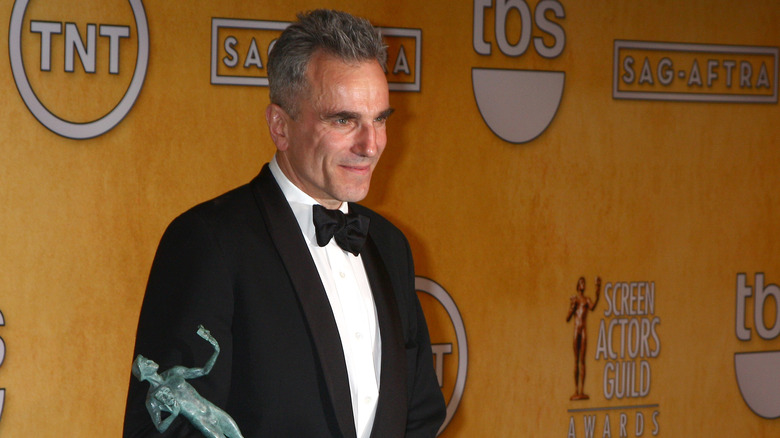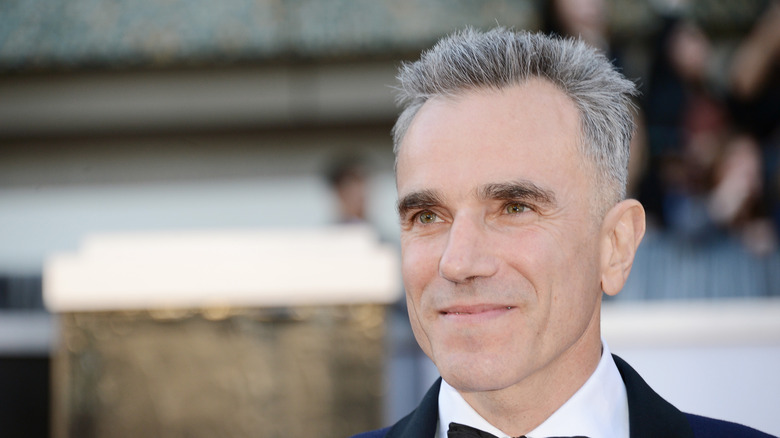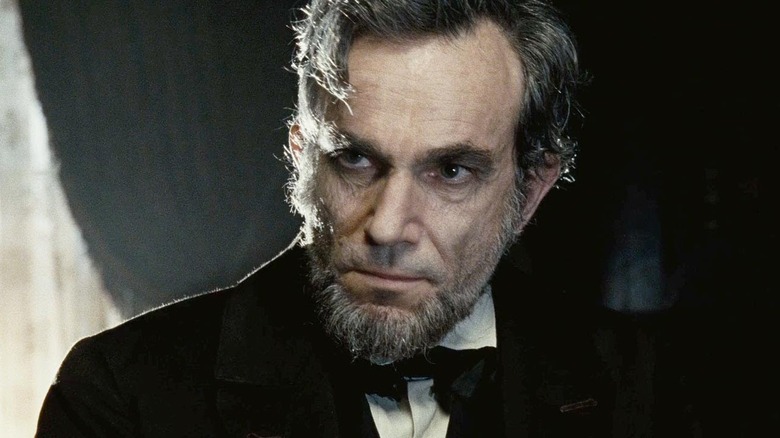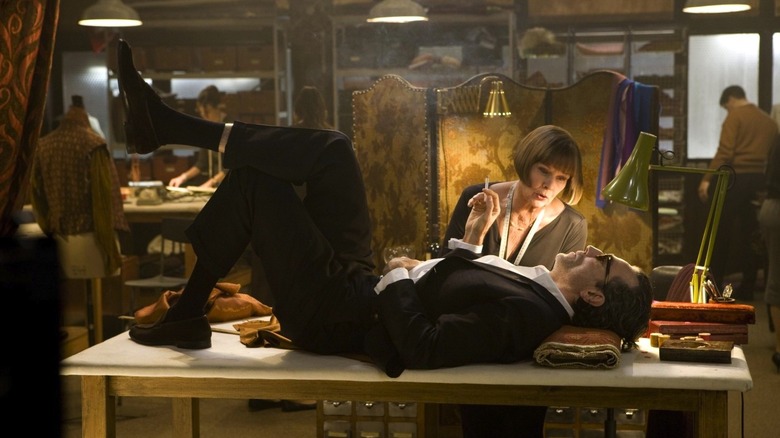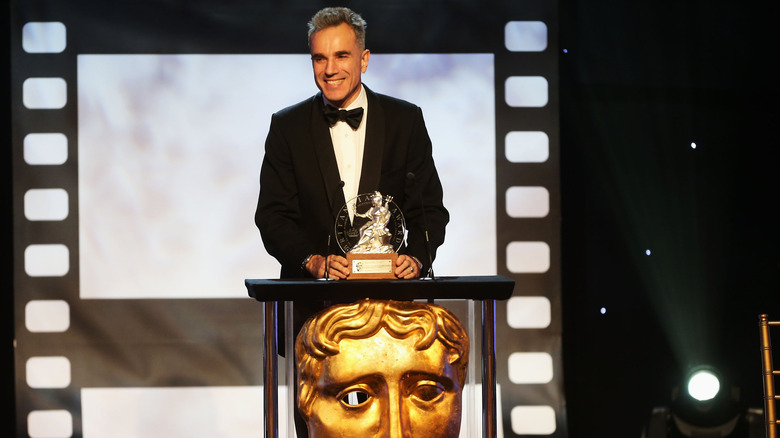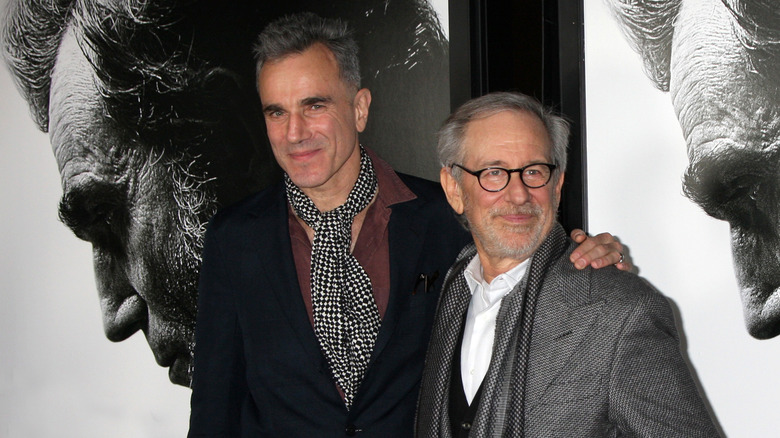Daniel Day-Lewis Isn't The Greatest Actor Of All Time (But He Doesn't Have To Be)
Daniel Day-Lewis has long been called the greatest actor ever, but his talents deserve a far deeper consideration than that.
It's been almost six years since Daniel Day-Lewis retired from acting, and we still live in the shadow of his influence. The legendary actor, who turns 66 today, has the kind of reputation that 99% of his colleagues would kill for. After nearly 40 years on stage and screen, Day-Lewis earned the moniker of The Greatest Actor of All-Time from more than one publication. A Time cover story from 2012 declared him to be the "World's Greatest Actor" while a 2013 article in the Guardian said that he had "taken up residence in the Pantheon" of actorly genius alongside the likes of Laurence Olivier and Marlon Brando.
Choosing just one mere mortal to bear the weight of this honor is near impossible, but it is notable how often Day-Lewis's name comes up as a consensus pick of sorts. It's also easy to see why, given the caliber of work he's given audiences over four decades of acting. But is it deserved? Can we ever make that kind of declaration about someone, let alone Daniel Day-Lewis? Sure, but the details are far more interesting than the hype-friendly label.
What made Daniel Day-Lewis so special?
Let's get it out of the way: Yes, Daniel Day-Lewis is a phenomenal actor. You only need to see the surprisingly few films he made to understand that. Consider how he brought President Abraham Lincoln to life in Steven Spielberg's "Lincoln," moving beyond the parodies to bring deftly layered humanity and savvy to someone who nowadays seems more like myth than man. In "There Will be Blood," he is explosive and charismatic, an oil man with evangelical zeal who uses his larger-than-life bombast to bully and belittle his enemies until he encounters the one man he never should have underestimated. The sheer physicality of "My Left Foot," where he plays the artist Christy Brown, who lived with cerebral palsy, is now the stuff of actorly legend. It's no wonder he won Oscars for each of these performances, making him the only man with three Best Actor trophies to his name.
Outside of those scene-stealing performances of pure grandeur, Day-Lewis also demonstrated immense and oft-underrated subtleties. He gives some of his greatest talents over to romantic dramas like Martin Scorsese's achingly elegant "The Age of Innocence" and the beautifully twisted power play of "Phantom Thread." There's a malleability to his presence that makes him as solid a fit for contemporary roles as historical ones, although he did seem to do more of the former than the latter for whatever reason. It's a sign of his strengths that almost every film performance he gave could be divided between the two categories of "masterful" and "great."
Day-Lewis' acting style changed Hollywood
One cannot talk about Day-Lewis' work without diving into the process behind it, and how that left behind an astonishing, if somewhat messy, legacy. Perhaps even more than the performances, we talk extensively about the method of his acting. It could be argued that nobody did more to redefine the expectations of cinematic performance over the past 40 years than Day-Lewis, making him to his generation what Marlon Brando was to the end of the Hollywood studio era. It was Day-Lewis' astonishing commitment and no-holds-barred approach to preparing for each film that grabbed the headlines over the years, turning him from just another good actor to something almost beyond mortal. We could be here all day detailing the myriad ways he went above and beyond for his projects: remaining in a wheelchair and having crew members spoon-feed him while playing a man with cerebral palsy for "My Left Foot"; learning to live off the land and carve his own canoe for "The Last of the Mohicans"; living off prison rations, going without sleep for days, and getting crew to verbally abuse him for "In the Name of the Father." And that only scratches the surface! This is the man who sent text messages to Sally Field in-character as Abraham Lincoln.
Day-Lewis is famed for remaining in-character even when the director calls "cut." If that means he can't put on a puffer jacket to stay warm between takes, then so be it (such was the case for "Gangs of New York," where he was later diagnosed with pneumonia due to the cold.) He's not the only one to do so, nor is he the sole actor who has gone to such lengths for a role, but they became so synonymous with Daniel Day-Lewis as a performer that this strain of the so-called Method is inextricably entwined with his legacy. Indeed, it might be a larger part of said legacy than any single film. Any actor who tries to replicate this, from Christian Bale and Joaquin Phoenix to Charlize Theron and Austin Butler, risks comparisons to Day-Lewis. It's a process many find admirable while others consider it tedious. Certainly, since Day-Lewis retired, there's been far more scrutiny of this method, thanks to showboating self-flagellation from the likes of Leonardo DiCaprio or the needless dramatics of Jared Leto.
Why Daniel Day-Lewis isn't the greatest
Sometimes, it's impossible to talk about Day-Lewis as a simple actor and the performances within, thanks to the mythology (part self-created, part inflated by media fascination) that permeates every aspect of his work. His aforementioned track record speaks for itself but amid that sea of excellence are a couple of duds and forgettable moments. Even the mighty Daniel Day-Lewis was never infallible, giving an awkward and misjudged performance in Rob Marshall's stilted adaptation of the musical "Nine." His skill with accents fails when asked to play a dramatic Italian director, and his singing voice doesn't have the strength of range to do justice to the songs. He's outshone at every turn by his primarily female castmates, including Penelope Cruz, Marion Cotillard, and even Fergie. When Fergie's putting in a better performance than Daniel Day-Lewis ... See, even the greats are only human.
It's rare to find an actor who can literally do every kind of role, but that's Day-Lewis' reputation and it's certainly not true. There's essentially no comedy in his filmography except for a forgotten (and not especially interesting) one from 1988 called "Stars and Bars." He's not incapable of eliciting laughs from an audience, as evidenced by his archness in "Phantom Thread," but we never got as much of that ability in his back catalog. We also didn't see him play, to put it bluntly, a ton of regular dudes. It's no surprise that an actor interested in pushing the limits would not prioritize playing some average guy, but surely that is the ultimate test of a performer's prowess
What does it mean to be the greatest?
Trying to pick the greatest actor is like trying to decide which star in the sky is the best. It's an impossible endeavor, one that requires a series of boundaries to make the task even vaguely manageable. With acting, which is already a difficult art to judge, critics tend to rely on familiar tropes. We like realism, range, and emotion (usually from white dudes speaking English.) We see certain roles as more difficult than others, whether it's playing a real-life figure, doing a tough accent, or drowning beneath a mass of prosthetics. Essentially, we want to see the acting, and you can't deny that you see all of the labor that goes into Day-Lewis' work. It's undoubtedly impressive, even though it tends to overshadow some of the more nuanced aspects of what he does (there's a reason he won an Oscar for "My Left Foot" but not "Phantom Thread.") Hollywood in particular is enamored with the notion that acting should look as tough as possible, should be a Herculean display of physical and mental agony. That's certainly compelling to watch, but to limit great acting to such a concept overlooks so much of what makes the craft a thrill.
Our definitions of greatness, certainly when it comes to film history, are often limited to the golden gates of Hollywood. That leaves behind decades of phenomenal international performers, from Toshiro Mifune and Delphine Seyrig to Shah Rukh Khan and Kim Min-hee. The uniform focus on realism omits actors who try something truly experimental with the form, such as the instantly recognizable work of Nicolas Cage and the icons of German Expressionism who inspired him. Comedic actors always get the short end of the stick in this debate, leaving behind some of the most influential figures in film, like Jacques Tati, Carole Lombard, and Madeline Khan. There are also true capital-M Movie-stars, whose inimitable charisma made the big screen so captivating, including Denzel Washington and Tom Hanks. And this barely scratches the surface. Surely there are many actors without Oscars on their shelves who could stand shoulder-to-shoulder with Day-Lewis: Judy Davis, Isabelle Huppert, Toni Servillo, Sônia Braga, Willem Dafoe, Barbara Stanwyck, Isabella Adjani, Carmen Maura, and way too many more to count.
Daniel Day-Lewis shouldn't have to be the greatest
Daniel Day-Lewis always shied away from lavish proclamations of his greatness, preferring to be self-deprecating about his work while sharing the praise with his contemporaries. It's probably an exhausting weight to bear, to be considered so beyond human in your talents that every move you make is enshrined in Hollywood lore (and bastardized by far less talented actors.) His status in history is guaranteed, forever to be seen as a crucial foundation of cinematic performance of the past 50 years.
He's a brilliant actor, one of the greats of his time, but surely we should leave room for there to be more greats to follow in his path? Picking one person as The Greatest doesn't give the next few decades of the art form much room to grow, and the industry is in a long-overdue period of change that could surely use such space. Let's see where the craft goes from here, where it can have room to experiment and a wider platform of performers from across location, age, race, gender, and approach.
